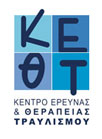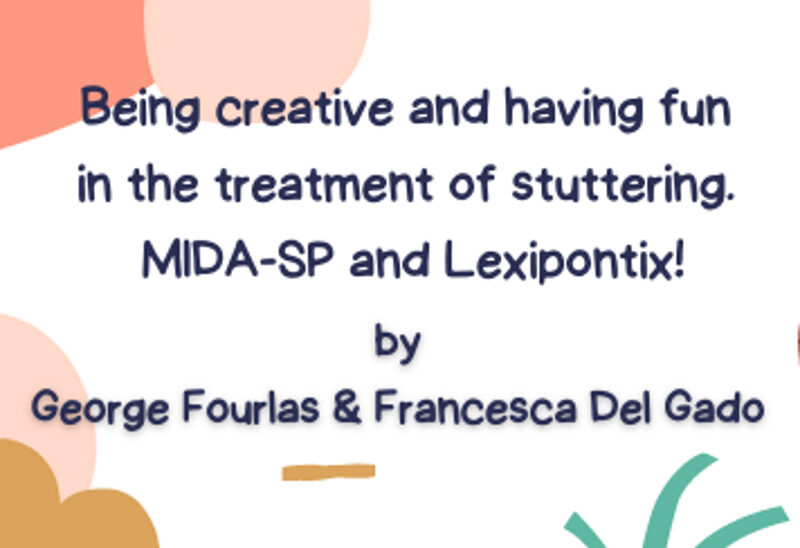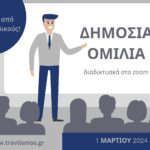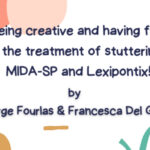Being Creative and Having Fun in the Treatment of Stuttering. MIDA-SP and Lexipontix!
Francesca Del Gado – George Fourlas
Chair: Joseph Agius
Discussants: Kasia Wesiersca, Selma Saad, Sertan Ozdemir
Thursday, 30th of March, 2023 at UTC-16.00 hrs. (17.00 hrs. Italy, 18.00 hrs. Greece).
REGISTER HERE FOR FREE
Having fun and being creative in providing therapy for school age children who stutter are common features of the MIDA-SP and Lexipontix Programme. In this workshop George Fourlas and Francesca Del Gado present and discuss the principles of each programme emphasising on the ways each programme introduces concepts of therapy and clinical practices in a child friendly way that makes sense and is fun. Well known fluency specialists will comment on the presentation, opening the discussion for the audience.
About MIDA-SP
The MIDA-SP is a multidimensional, integrated and differentiated program which uses art-mediated activities to make clients practice the acquired competences. The MIDA-SP aims to reduce both the overt aspects and the covert aspects of stuttering and using art-mediated therapy that is a combination of live theatre performances by clients, the dubbing of clients voices into movies and performed reading tales. The data collected on the efficacy of MIDA-SP have shown that this program is effective for the treatment of stuttering (Tomaiuoli et al.2012). The MIDA-SP (Multidimensional, Integrated, Differentiated, Art-mediated – Stuttering Program) is an approach created by the CRC Balbuzie in Rome, aiming at treating comprehensively the person who stutters. The MIDA-SP integrates 3 rehabilitation components: speech-language therapy, transfer activities and art-mediated training. The integration with the mediated arts arises from the desire to let the people who stutter to experience the use of the skills acquired in situations that are challenging for him, characterized by time pressure and interaction with one or more other subjects in a creative and motivating way (Tomaiuoli et al., 2015). The proposed integrative activities of speech therapy, make use of the contribution of the mediated arts and, in line with the CBT approach, expose the subject to the feared stimulus that produces an anxious reaction in him (Iverach at al., 2009), encouraging him to confront it.
About Lexipontix
Lexipontix is a structured therapy program for children who stutter aged 8 to 12 years. The program addresses the overall stuttering experience of the child and family, aiming at “Communication Restructuring” (Fourlas & Marousos, 2014). It uses the ICF model (WHO, 2001) as a clinical framework for assessment and treatment. It is based on the theoretical principles and clinical practices of Cognitive Behaviour Therapy, Solution Focused Brief Therapy, Parent-Child Interaction Therapy, Fluency Shaping and Stuttering Modification and integrates those practices in therapy in a child friendly manner. The program lasts for twelve sessions over a period of three months followed by a closing session one month after. Then, progress is monitored by follow up sessions for a period of one year. Therapy develops as a role game between the mouse called Lexipontix and the child in the role of a Superhero who defends his “Factory of Mind” with the help of the parents and therapist, members of the child’s (therapeutic) “Alliance” (Fourlas & Marousos, 2015). The alliance empowers the child to identify the invasions of Lexipontix in the “Factory of Mind” and to explore the use of “Tools” in order maintain or regain control over the components of the “Factory of Mind” i.e. the “Machine of Thoughts”, the “Lab of Emotions”, the “Body Sensors” and the “Machine of Behaviors and Words”. Parents and child learn and practice with the use of different “Tools” by playing board and card games as well as participating in real life “Experiments” and “Missions”. As a result of therapy, the threatening mouse gradually becomes a companion pet. (Fourlas, 2016).
Presenters
Francesca Del Gado. Speech therapist, Fluency specialist (ECSF graduated). Specialized in the evaluation and rehabilitative treatment of stuttering and verbal fluency disorders for all age groups. Lecturer on Stuttering in “Sapienza University of Rome. She has participated in various national and international research projects with the working group of Prof. Donatella Tomaiuoli in the field of assessment and treatment of verbal fluency disorders, collaborating in the development of a MIDA-SP rehabilitation program. She collaborates with the organization of the ICOS International Conference on Stuttering. She carries out training activities and is a speaker at national and international conferences on the rehabilitation of verbal fluency disorders.
George Fourlas is a Speech and Language Therapist, Fluency Specialist (EFS), head of the Stuttering Research and Therapy Centre (ΚΕΘΤ) in Athens, Greece. He is lecturer and coach in the European Clinical Specialization in Fluency (ECSF). He is involved in clinical work, research, lecturing and clinical supervision and he is co-author of the Lexipontix Programme for School-age CWS. He is a member of the IALP fluency committee and the Greek SIG in Fluency Disorders.
Chair
Dr. Joseph G. Agius is a Registered European Fluency Specialist and Speech Language Pathologist with special interest in fluency disorders and humour research. As partner expert nominated by the University of Malta, Dr. Agius collaborates with experts from thirteen European Universities on the development and delivery of the ‘European Clinical Specialization Course in Fluency Disorders’ (ECSF). He is Executive Allied Health Practitioner at the Speech Language Department, Ministry of Health, Government of Malta and Steering Committee Member of ECSF. He is author of the iOS application ‘Fluency SIS’ – Smart Intervention Strategy for school age children who stutter.
Discussants
Katarzyna Węsierska is a professor at the University of Silesia in Katowice, Poland, and a European Fluency Specialist. In her research and clinical practice, she focuses mainly on stuttering and cluttering. She is an author of numerous of publication in the field. She collaborates with international organizations from different countries to disseminate knowledge and change social attitudes towards fluency disorders. At the 11th Oxford Dysfluency Conference she was awarded the David Rowley Award for International Initiatives in Stuttering.
Selma Saad Merouwe is a Slovak-Lebanese SLT. She is specialized in fluency disorders (ECSF, EFS) and a PhD candidate (university of Turku-Finland and Saint-Joseph university-Lebanon). She is lecturer, graduate program coordinator, researcher and clinical supervisor at the Higher Institute of Speech-Language Therapy of Saint-Joseph University. Her research, clinical practice and teaching focus on fluency disorders, and bilingualism. She is national representative of the Stuttering committee (Lebanon), member of the Practice committee in the International Fluency Association, and national representative in the International Cluttering Association.
Sertan Özdemir, Ph.D., is a faculty member and the current head of the SLT department at Istanbul Medipol University. His main area of interest is fluency disorders. He has been lecturing and conducting research in the SLT field and he is a graduate of the “European Fluency Disorders Specialization Program” (ECSF). He is a member of Turkish SLT Association and the national representative in International Cluttering Association.






